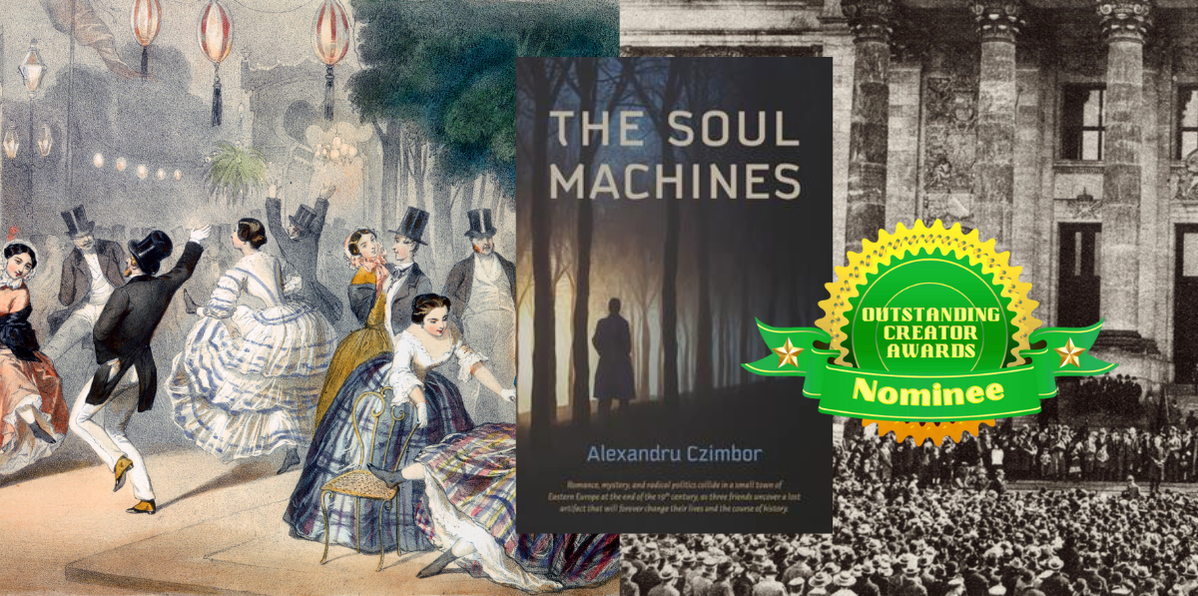|
Score: 93+/100 (9.3+ out of 10)
The Soul Machines by Alexandru Czimbor excels in one key way: portraying a drastically, dramatically changing world. The world-building in this book is excellent. You can literally feel the transition between the old world and the new—a shift of monumental proportions perhaps unparalleled in human history. The beginning of this book almost made us think that it was set in the late 1100s during the Medieval Inquisition and feudalism in Europe. We thought we were reading a book that took place in the Middle-Ages! Do you blame us? The novel follows a Romanian-Hungarian peasant named Vogt Tudor (often just called “Tudor”) who lives near the bottom of a very hierarchical society dominated by the clergy (the Catholic Church) and the aristocracy (the ultra-rich/old money). This book does an extraordinary job at showing us and contrasting the old ways of the old world: hierarchy, aristocracy, feudalism, religious dogmatism, arranged marriages, misogyny, corporal punishment of students, segregation, divisions between races and social classes, ethnocentrism, a lack of worker's rights, a lack of rights for women and minorities, a lack of civil rights, indentured servitude, and ultra-nationalism leading to fascism. Well, guess what? This book takes place at the end of the 19th century! That was a shocker to us as well. It's a foreign world. A world that seems so unfamiliar and alien, yet it's stunningly our world from a different time: a harsh, brutal, unrefined, unenlightened time. Beside showcasing a hauntingly unfamiliar, alien Europe, this book also puts us in the shoes of people who reflect different demographics of the time. There's Sami, the gypsy. There's Roni, the pure-blooded Hungarian. There's Mikhaila, the budding feminist at a time before feminism as we know it. There's also Orsolya, a girl who pays the price for her father's failing business through a forced arranged marriage to Karoly, one of the most despicable characters in the book (we'll get to him soon). Orsolya, being of higher birth, is loved and admired by Tudor, creating a tragic class-divided dynamic similar to Jack & Rose from Titanic. It's actually quite romantic and compelling in that regard. Orsolya herself is a wonderfully tragic character who held us by the heartstrings similar to Ophelia from Hamlet. The will-they/won't-they dynamic between her and Tudor really kept us reading, even into the later chapters after they'd been separated for so long. We really hoped they might rekindle the close, taboo bond they shared. This book has several memorable villains. Among them are “the bishop” who terrorizes the characters throughout the first half of this book, and whose oppressive presence lingers throughout. The bishop is a man, similar to Frollo from The Hunchback of Notre Dame, who is blinded by his religious convictions, believing that he is beyond reproach and can do no wrong. The bishop believes that the ends justify the means. In other words, he has convinced/deluded himself that because he “serves God” he is free to hurt people if it means doing so. He even owns his own dungeon. The bishop also seems to extort money from the poor and desperate (perhaps through “tithing”) while also taking bribes from the rich. He represents the worst of the religious order and religious dogma in general. He makes the lives of the other characters an oppressive living hell. Another tremendous villain is Karoly, the bishop's nephew. However, Karoly seems to represent more the corruption of money and nobility rather than of a religious belief system. Karoly is RICH. Being rich, he seems to believe that he can do whatever he wants, marry whoever he wants, use whoever he wants, and abuse whoever he wants without consequence. He is also a primordial Nazi, holding very racist beliefs and frightening beliefs about white supremacy and German superiority. Despite being related to the bishop, he really doesn't seem to use religion as an excuse for his actions like the bishop does. Karoly is guided by wealth and power. What's fascinating about this book is that you actually get to follow Karoly and his frighteningly delusional thought process at times. It's somewhat like when we heard about Garrett in Pounding Bass. He is always excusing his actions based on his status as a pure-blooded German and his wealth, feeling entitled to do great evil. With all that said, our favorite character by far was the count, Richter. Count Richter seems to be the author's primary mouthpiece, and perhaps the book's greatest voice of reason. This is a phenomenally significant statement considering that this book is FILLED TO THE BRIM with irrational, illogical people blinded by religious dogma, socio-political ideologies (like proto-Nazism, fascism, socialism, and communism), and simple ignorance due to a lack of education. Count Richter is highly educated and highly cultured (and familiar with other cultures). Despite being from old money, he doesn't allow it to blind him to the suffering or plight of others. He doesn't feel better or superior to others. However, he does believe in mutual respect and meritocracy. He doesn't demand that the monks fall to their knees at the sight of him, but he does demand that they not threaten him with violence. He doesn't tell the socialists that they're stupid or low-lifes, but instead has a civil debate/conversation with them. He believes in providing incentives for hard word, merit, and new/good ideas. For this, we greatly applauded him. Some of his statements near the end of this book literally had us clapping and cheering. Check this out on Amazon!
1 Comment
6/23/2023 12:13:12 pm
<a href="https://www.supplementguidesg.net">Informative Source For Healthcare</a> || <a href="https://www.supplementguidesg.net">supplementguidesg</a>
Reply
Leave a Reply. |
Archives
July 2024
Categories |

 RSS Feed
RSS Feed